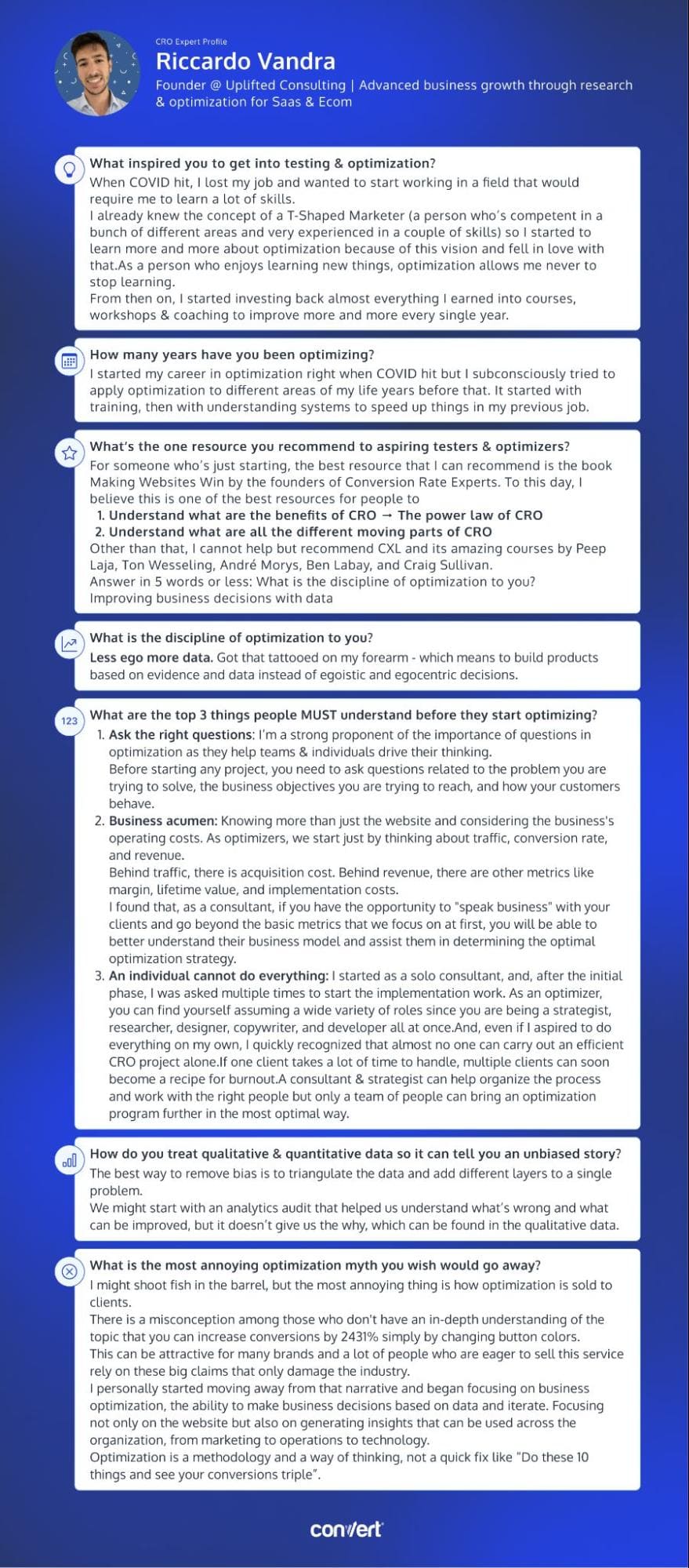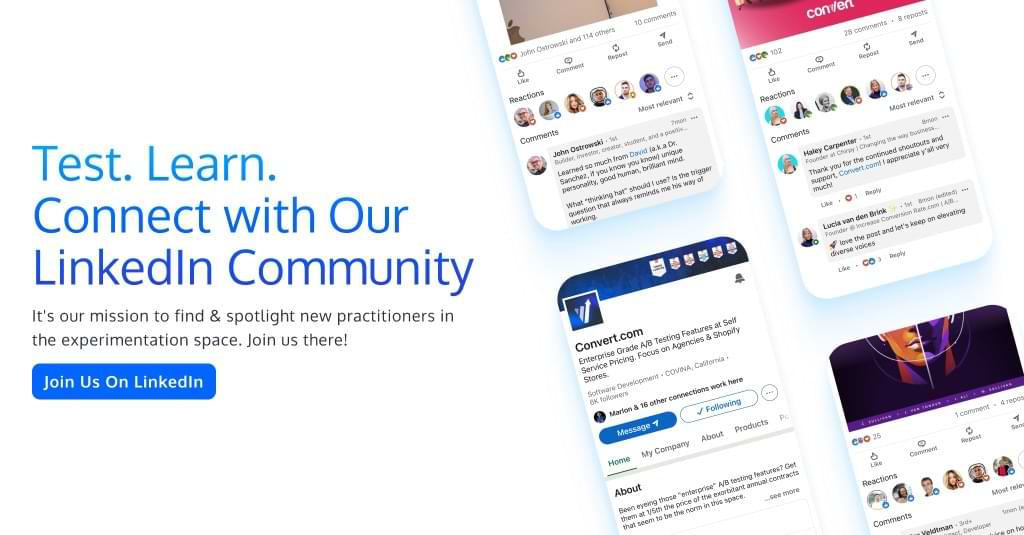Testing Mind Map Series: How to Think Like a CRO Pro (Part 29)
Interview with Riccardo Vandra
Riccardo Vandra of Uplifted Consulting might be a newcomer to the world of CRO, but his enthusiasm and unwavering passion for the craft set him apart.
Riccardo takes a holistic approach to optimization, looking beyond simple fixes. He says that understanding a client’s business model is essential to crafting a strategy that works best for them.
But even more important for a program’s success is teamwork: it matters more than anything else because experimentation cannot succeed without the right people in the right roles.
His insight and perseverance have not remained unnoticed; he has quickly established himself as someone to watch!
Now, let’s dive into the interview…
Riccardo, tell us about yourself. What inspired you to get into testing & optimization?
When COVID hit, I lost my job and wanted to start working in a field that would require me to learn a lot of skills.
I already knew the concept of a T-Shaped Marketer (a person who’s competent in a bunch of different areas and very experienced in a couple of skills) so I started to learn more and more about optimization because of this vision and fell in love with that.
As a person who enjoys learning new things, optimization allows me never to stop learning.
From then on, I started investing back almost everything I earned into courses, workshops & coaching to improve more and more every single year.
How many years have you been optimizing for?
I started my career in optimization right when COVID hit but I subconsciously tried to apply optimization to different areas of my life years before that.
It started with training, then with understanding systems to speed up things in my previous job.
What’s the one resource you recommend to aspiring testers & optimizers?
For someone who’s just starting, the best resource that I can recommend is the book Making Websites Win by the founders of Conversion Rate Experts.
To this day, I believe this is one of the best resources for people to
- Understand what are the benefits of CRO → The power law of CRO
- Understand what are all the different moving parts of CRO
Other than that, I cannot help but recommend CXL and its amazing courses by Peep Laja, Ton Wesseling, André Morys, Ben Labay, and Craig Sullivan.
Answer in 5 words or less: What is the discipline of optimization to you?
Improving business decisions with data
What are the top 3 things people MUST understand before they start optimizing?
- Ask the right questions: I’m a strong proponent of the importance of questions in optimization as they help teams & individuals drive their thinking.
Before starting any project, you need to ask questions related to the problem you are trying to solve, the business objectives you are trying to reach, and how your customers behave. - Business acumen: Knowing more than just the website and considering the business’s operating costs. As optimizers, we start just by thinking about traffic, conversion rate, and revenue.
Behind traffic, there is acquisition cost. Behind revenue, there are other metrics like margin, lifetime value, and implementation costs.
I found that, as a consultant, if you have the opportunity to “speak business” with your clients and go beyond the basic metrics that we focus on at first, you will be able to better understand their business model and assist them in determining the optimal optimization strategy. - An individual cannot do everything: I started as a solo consultant, and, after the initial phase, I was asked multiple times to start the implementation work.
As an optimizer, you can find yourself assuming a wide variety of roles since you are being a strategist, researcher, designer, copywriter, and developer all at once.
And, even if I aspired to do everything on my own, I quickly recognized that almost no one can carry out an efficient CRO project alone.
If one client takes a lot of time to handle, multiple clients can soon become a recipe for burnout.
A consultant & strategist can help organize the process and work with the right people but only a team of people can bring an optimization program further in the most optimal way.
How do you treat qualitative & quantitative data to remove bias?
The best way to remove bias is to triangulate the data and add different layers to a single problem.
We might start with an analytics audit that helped us understand what’s wrong and what can be improved, but it doesn’t give us the why, which can be found in the qualitative data.
What is the most annoying optimization myth you wish would go away?
I might shoot fish in the barrel, but the most annoying thing is how optimization is sold to clients.
There is a misconception among those who don’t have an in-depth understanding of the topic that you can increase conversions by 2431% simply by changing button colors.
This can be attractive for many brands and a lot of people who are eager to sell this service rely on these big claims that only damage the industry.
I personally started moving away from that narrative and began focusing on business optimization, the ability to make business decisions based on data and iterate. Focusing not only on the website but also on generating insights that can be used across the organization, from marketing to operations to technology.
Optimization is a methodology and a way of thinking, not a quick fix like “Do these 10 things and see your conversions triple”.
Download the infographic above and add it to your swipe file for a little dose of inspiration when you’re feeling stuck!
Riccardo’s insights into the world of CRO have been nothing short of refreshing and eye-opening. We hope this interview has given you some valuable insights and advice on how to experiment more effectively.
What piece of advice resonated most with you?
Check back twice a month for upcoming interviews! And if you haven’t already, check out our past interviews with CRO legends Gursimran Gujral, Haley Carpenter, Rishi Rawat, Sina Fak, Eden Bidani, Jakub Linowski, Shiva Manjunath, Deborah O’Malley, Andra Baragan, Rich Page, Ruben de Boer, Abi Hough, Alex Birkett, John Ostrowski, Ryan Levander, Ryan Thomas, Bhavik Patel, Siobhan Solberg, Tim Mehta, Rommil Santiago, Steph Le Prevost, Nils Koppelmann, Danielle Schwolow, Kevin Szpak, Marianne Stjernvall, Christoph Böcker, Max Bradley, and our latest with Samuel Hess.
Written By
Riccardo Vandra
Edited By
Carmen Apostu



